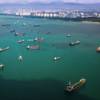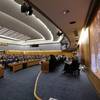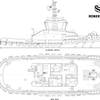Libya's mission to the United Nations has asked the Security Council to remove from a U.N. blacklist an Indian-flagged tanker that was recently prevented from shipping oil for the rival eastern Libyan government, Libya's U.N. envoy said on Thursday.
The tanker Distya Ameya was blacklisted last month after the rival eastern government's parallel oil company attempted to use it to ship a cargo of 650,000 barrels of crude. The U.N. measure requires states to ban the ship from entering any port around the world.
Libyan Ambassador Ibrahim Dabbashi told Reuters his mission had submitted an official request, though he did not know when the delisting might take effect. It will be up to the 15-nation council's Libya sanctions committee to make a decision.
Dabbashi said the request was made "because of the cooperation of the flag state and the explanation given on the involvement of the ship in the illegal export."
He said the tanker's operators had no intention of getting involved in an improper transaction and had lacked proper information.
Two competing governments, one in Tripoli and one in the east, backed by armed factions, have struggled for control of the North African OPEC state since 2014.
The eastern administration has set up its own National Oil Corporation in parallel to the Tripoli-based NOC.
A U.N.-backed unity government, designed to replace the rival administrations, arrived in Tripoli earlier this year and is attempting to assert authority over the whole country.
Western powers fear any attempt by the eastern NOC to export crude independently would undermine the Tripoli government and further fracture the country along regional lines.
The eastern NOC claims legitimacy from the government and parliament based in eastern Libya, which received international recognition after armed opponents took control of Tripoli in 2014 and installed rival institutions there.
The new U.N.-backed unity government, which is an attempt to end the conflict, faces resistance from hardliners in both factions, whose rivalries steadily emerged following the 2011 uprising against Muammar Gaddafi.
The U.N. Security Council recently passed a resolution saying the new unity government has "primary responsibility" for preventing illicit oil sales, urging it to communicate any such attempts to the U.N. committee overseeing Libya-related sanctions.
There will be ministerial talks on providing support for Libya's new unity government in Vienna next week. The meeting will focus on international efforts to bring stability to Libya.
(By Louis Charbonneau)













